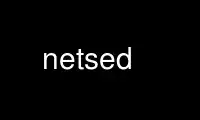
This is the command netsed that can be run in the OnWorks free hosting provider using one of our multiple free online workstations such as Ubuntu Online, Fedora Online, Windows online emulator or MAC OS online emulator
PROGRAM:
NAME
netsed - a network stream editor.
SYNOPSIS
netsed {proto} {lport} {rhost} {rport} {rule} [rule ...]
DESCRIPTION
netsed is a small and handy utility to alter, in real time, the contents of packets
forwarded in a network stream, or in a datagram connection. When called with a set of
replacement rules, these rules are tested for applicability to each packet entering in
either direction.
ARGUMENTS
proto
Determines the protocol for the desired connection: "tcp", "TCP", "udp", or "UDP".
lport
The local listening port for the connection. A service name, or a numerical port
value, is acceptable.
rhost
The remote host with whom the connection is desired. Resolvable host names and
IPv4/IPv6 addresses are equally usable.
As a special case, assigning "0" to rhost will insert the kernel's knowledge of the
targeted host address, in a situation where a netfilter rule is redirecting traffic.
This happens when running a transparent proxy service.
rport
The remote port to connect to. A service name, or a numerical port value, is
acceptable.
Also here a value "0" will be acceptable to arrange a transparent proxy service, as
the kernel's tracking will provide the intended remote port number.
rule
At least one replacement rule is mandatory. The general syntax for this is:
s/pat1/pat2[/flag]
The effect is to replace the text that matches pat1 with the expansion of pat2. The
optional parameter flag is a composite containing a numerical value limiting the
maximal number of times the rule can be applied, or a direction semaphore indicating
that the rule applies only to incoming (coded as 'I' or 'i') or outgoing ('O' or 'o')
traffic. One could say that the rule expires after num occurrences.
The rules are applied in succession to all passing packets, flowing in either
direction. As soon as a rule has been expired, it is removed from the collection of
active rules for the current connection. Observe that any counter is started as the
connection is initiated, running as long as the connection is alive.
This holds directly for TCP connections, whereas for UDP a connection is considered to
consist of incoming data on fixed address and fixed port together with any response
from a remote server. When no datagrams have been transmitted for a period of 30
seconds, the UPD connection is seen as closed.
A single rule is limited to act on individual packets; a pattern can not match across
packet boundaries.
Using HTTP-like escape sequences for hexadecimal values, all eight-bit characters are
viable in the patterns. Thus the standard character pair CRNL would code as "%0a%0d".
In a pattern, the percentage sign itself must be escaped by duplication. Thus a string
"%%" is interpreted in a pattern as a literal percentage sign.
EXAMPLES
A handful replacement rules are handy as examples.
s/andrew/mike
Replace every occurrence of the string "andrew" with "mike", in every passing packet.
s/andrew/mike/1
Replace only the first occurrence of the string "andrew" for "mike" in each packet.
Any repetition is unaltered, unless a further rule specifies some replacement.
s/andrew/mike%00%00
Replace in each packet every occurrence of the string "andrew" with "mike\x00\x00" .
The padding with two null bytes ensures an unaltered packet length, which might be
essential at times.
s/%%/%2f/20
Replace the first twenty occurrences of the percentage character '%' with slashes '/'.
s/Rilke/Proust/o, s/Proust/Rilke/i
Let Rilke travel incognito as Proust, i.e., on outgoing packets replace Rilke's real
sirname by Proust, then restore it again in any incoming packet.
Use netsed online using onworks.net services
